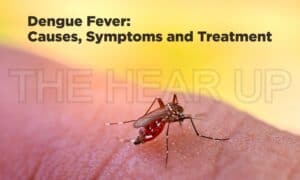Latest News
Dengue: Causes, Symptoms, Prevention

Dengue
Dengue fever is caused by mosquito bites. Dengue fever is most common in tropical or subtropical regions because mosquitoes reproduce easily in these areas. Countless cases of dengue fever are affected in India every year.
So far, there is no vaccine against dengue fever, but medical researchers are working hard to develop a reliable vaccine. The best way to escape dengue fever is to prevent mosquitoes from breeding in or around you.
Causes:
There are four types of known dengue virus transmitted from mosquito bites. When a person infected with dengue is bitten by a mosquito and then another person is bitten by an infected mosquito, the virus enters his/her body through the blood. Once you recover from dengue fever, you can be immune to a specific virus that has affected you, but you are still vulnerable to the other three viruses, which increase the risk of severe dengue fever.
Mosquitoes that cause the spread of dengue fever have been found near human habitats, and they reproduce rapidly under tropical conditions.
Young children or people who have never been infected with the dengue virus usually have milder symptoms than those who have been infected. However, there is always a risk of severe symptoms.
Symptom:
When you are infected with dengue fever, symptoms usually occur 4 to 7 days after being bitten by an infected mosquito. The known symptoms of dengue fever may be as follows:
- headache
- fever
- Vomiting
- eye pain
- Rash on the skin
- nausea
- Body pain
- Muscle or joint pain
The above symptoms occur in the case of mild dengue fever, and patients usually recover within 7-14 days.
Although dengue fever can aggravate the disease and may even be fatal, the patient should be intensively monitored due to vascular leakage and decreased platelet counts in the blood. If left untreated, dengue hemorrhagic fever can lead to death. The symptoms of this condition are:
- Severe abdominal pain
- Vomiting
- Bleeding gums
- Blood in the stool or urine
- Difficulty breathing
- fatigue
- Tired
If the patient has severe symptoms, it is recommended to go to the emergency room of the hospital as soon as possible.

Prevention
Prevent water stagnation
The stagnant water provides the best place for mosquitoes to reproduce and reproduce. Check if there is no water in your plants, garden, or tires
Best to stay indoors
If dengue fever is spread in your area, please avoid playing outdoors or taking unnecessary risks; until night, the mosquitoes that cause dengue fever are most active. Best to stay in a place with air conditioning
Wear full sleeves
Wear full-sleeve clothing to protect your skin from mosquito bites. Cover yourself with long sleeves, pants, and shoes
Use insect repellent
There are various mosquito repellents on the market. You can use them on clothes, at home, and even on your skin
Avoid going to areas prone to dengue fever
Don’t go to places where dengue fever is the rampant, poor condition or lack of hygiene
Avoid being bitten by mosquitoes
As there is currently no specific treatment, the best way to prevent dengue fever is to avoid being bitten by mosquitoes
Ensure clean
Check your surroundings regularly to ensure that there are no mosquitoes in or around your house
The doctors at AMRI Hospitals emphasize preventive techniques, all our hospitals are equipped with emergency services, and believe that there is no time to delay.
Sebastian was born and raised in the busy city of Abbottabad. As a journalist, Saad Mushtaq has contributed to many online publications including the PAK Today and the Huffing Post. In regards to academics, Saad Mushtaq earned a degree in business from the Abbottabad UST, Havelian. Saad Mushtaq follows the money and covers all aspects of emerging tech here at The Hear Up.Thanks










